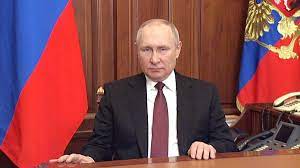Russia-Ukraine War: Russian President Vladimir Putin is seen.
The Russian president, Vladimir Putin, told the government and central bank that inflationary risks were growing in the country’s economy. He told them to keep things under control. Prices going up will make living standards worse, which is still one of Vladimir Putin’s biggest worries as he gets ready to run for re-election as prime minister next March for another six years.
In response to the Ukraine conflict, Russia’s central bank was forced to raise interest rates last week to prevent the rouble’s decline.
Vladimir Putin told government officials, “The scale and complexity of the tasks we are solving and will continue to solve are truly exceptional,” adding that the overall situation was stable but required vigilant monitoring and prompt decisions.
In 2022, Russia experienced double-digit inflation, but the rate of price increases slowed in the spring. Once again, inflation has surpassed the central bank’s 4% target and is rising consistently. In 2023, the expanding budget deficit and severe labour shortage in Russia contributed to the rising inflationary pressure.
Vladimir Putin stated that the volatility of the financial markets hindered companies’ investment decisions, directing, “The government and central bank must actively utilise the instruments at their disposal. Work is required, among other things, to limit unproductive, speculative demand, control the outflow of capital, and monitor the behaviour of the major financial market participants.”
It was essential for Russia to maintain a high level of industrial output, the Russian leader said, adding that the budget surplus for July through September was anticipated.
“For the entire year, the difference between expenditures and revenues will be around 2 percent of GDP,” he said.





